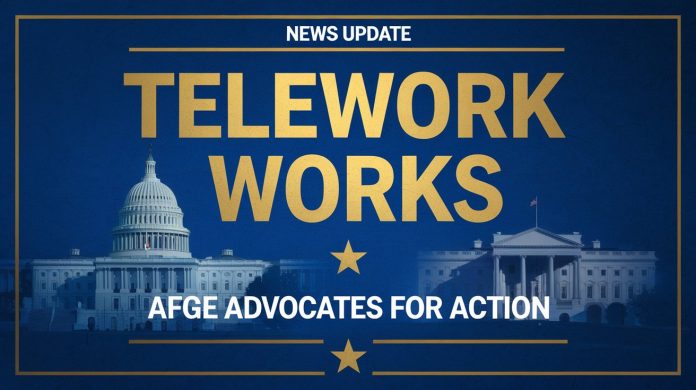AFGE’s Advocacy in Action
AFGE Local 17 is proud to share a powerful letter from Ranking Member Mark Takano of the House Committee on Veterans’ Affairs and Ranking Member Richard Blumenthal of the Senate Committee on Veterans’ Affairs, urging VA Secretary Doug Collins to protect telework and remote work policies at the Board of Veterans’ Appeals (BVA).
This letter is a direct result of AFGE’s tireless lobbying efforts on Capitol Hill, demonstrating the power of union advocacy in action. Our AFGE lobbyists worked diligently to ensure that lawmakers understand the critical role telework plays in the Board’s mission, productivity, and success.
Table of Contents
Why This Matters
BVA attorneys have expressed deep concerns about the potential loss of telework under the new administration’s push to return federal employees to in-person work. The numbers speak for themselves—BVA broke records in 2023, issuing over 103,000 appeals decisions, reducing the backlog, and increasing quality standards, all while operating primarily in a remote environment.
For years, telework has helped BVA:
- Increase productivity – Attorneys and Veterans Law Judges have surpassed previous decision-making benchmarks.
- Improve decision quality – Accuracy rates have climbed for both Legacy and AMA appeals.
- Reduce costs – The Board has downsized its physical office footprint, saving taxpayer dollars.
AFGE Is Fighting for You
The letter urges Secretary Collins to grant an exemption from President Trump’s return-to-office mandate, citing overwhelming evidence that telework enhances the Board’s effectiveness. Without telework, the Board risks a sharp decline in productivity, higher attrition rates, and a backlog crisis that will hurt Veterans.
This is why your union dues matter. AFGE is actively fighting to protect your rights and working conditions, ensuring that the voices of BVA attorneys are heard at the highest levels of government.
We will continue our advocacy in action, but we need your support. If you are not yet a member, now is the time to join AFGE Local 17 and stand with us in protecting telework and workplace rights.
Stay tuned for further updates as we continue this fight.
Read the Letter
You can download the signed letter by clicking the link at the top of this article or clicking the button below, or you can scroll down and read a transcribed version that we’ve included here for your convenience.
Letter to the Secretary of Veterans Affairs
February 10, 2025
The Honorable Doug Collins
Secretary of Veterans Affairs
Department of Veterans Affairs
810 Vermont Avenue NW
Washington, DC 20420
Dear Mr. Secretary,
We are writing to express our deep concern regarding potential changes to the telework and remote work policies at the Board of Veterans’ Appeals (BVA). The BVA plays a critical role in ensuring Veterans and their families receive the benefits they are entitled to under the law. Its mission to provide timely, fair, and impartial decisions on appeals is essential to the VA’s benefits system. We strongly urge you to maintain the existing telework and remote work arrangements, which have proven integral to the Board’s efficiency and success.
The BVA has made historic strides in managing its caseload, largely due to the expansion of telework and remote work policies. In Fiscal Year 2023, the Board adjudicated and dispatched a record-breaking 103,245 appeals – an 8.3% increase over FY 2022 – while also reducing the number of pending appeals for the first time in four years. This trend continued into FY 2024. As of the end of January 2025, the Board has issued 36,536 decisions this fiscal year – 3,776 ahead of last year’s pace – while also conducting 6,636 hearings.
These record-breaking results are not coincidental. They reflect the efficiency gains achieved through telework and the ability to attract and retain experienced attorneys and Veterans Law Judges (VLJs). Currently, over 90 percent of VLJs and decision-writing attorneys work remotely or are eligible for telework, and productivity has increased as a direct result. The quality of Board decisions has also improved for the third consecutive year, rising to 96 percent for Legacy appeals and 94 percent for AMA (Appeals Modernization Act) appeals in FY 2023.
Over the past five years, the BVA has strategically reduced its physical office footprint, cutting operational costs without compromising performance. In 2012, the Board occupied five floors at 425 I Street NW, Washington, DC. Today, it operates efficiently with just one floor, a reduction that has been facilitated entirely by telework and remote work programs. The continued success of remote and telework operations eliminates the need for costly expansion of office space and aligns with VA’s broader goals of responsible resource management.
On January 20, 2025, in the Return to In-Person Work announcements, President Trump instructed “[h]eads of all departments and agencies in the executive branch” to, “as soon as practicable, take all necessary steps to terminate remote work arrangements and require employees to return to work in-person at their respective duty stations on a full-time basis, provided that the department and agency heads shall make exemptions they deem necessary.”
As Secretary of Veterans Affairs, you have the authority to grant such an exemption to preserve telework and remote work arrangements at the BVA for the benefit of our nation’s Veterans. Given the overwhelming evidence that telework has increased productivity, improved case processing times, and reduced costs, granting an exemption for the Board is not only justified but essential.
President Trump’s misguided return to work mandate would not only require additional office space – incurring unnecessary costs – but it would also be a catastrophic blow to the Board’s operations. Such a move would result in a sharp decline in productivity and morale. When combined with canceled job openings due to the hiring freeze, these draconian policies will cause significant attrition of the BVA’s hard-working workforce and significantly undermine the Board’s ability to process appeals – further delaying the delivery of benefits to our nation’s veterans.
The Board’s ability to deliver timely, high-quality decisions is a matter of national importance, and any disruption to its operations would directly impact those who have served our country. The data is clear: remote work and telework agreements have improved productivity, efficiency, and cost-effectiveness at the BVA. In FY 2023 alone, the Board surpassed 100,000 decisions, reduced pending appeals for the first time in years, and improved quality assurance – all while operating primarily in a virtual environment. These successes should not be reversed.
We strongly urge the Department of Veterans Affairs to preserve and protect the current telework and remote work policies at the BVA. The ability to continue working remotely is essential to maintaining efficiency, reducing costs, and most importantly, ensuring that our nation’s Veterans receive timely decisions on their appeals.
Thank you for your attention to this urgent matter.
Sincerely,
Mark Takano
Ranking Member
House Committee on Veterans’ Affairs
Richard Blumenthal
Ranking Member
Senate Committee on Veterans’ Affairs
Cc: Representative Mike Bost, Chairman, House Committee on Veterans’ Affairs
Senator Jerry Moran, Chairman, Senate Committee on Veterans’ Affairs






What about the rest of VA? is AFGE to take action to save telework and remote work? NTEU Is:
NTEU filing national grievance with regard to workplace flexibilities
The Latest on Telework and Remote Work
On Friday, February 7, the Department of Health and Human Services sent a message to all HHS employees concerning HHS’s Revision to HHS Instruction 990-1, Workplace Flexibilities. It states that the February 7 message supersedes the January 24 revision.
The message states, in part, that all bargaining unit employees who have an official duty station within 50 miles of an HHS facility will report to an HHS facility by March 17.
This is in violation of Article 26 of the HHS-NTEU National Agreement.
The message also states, in part, that all bargaining unit employees who have an official duty station outside of 50 miles of an HHS facility will report to an HHS facility by April 28.
This is also in violation of Article 26 of the HHS-NTEU National Agreement.
The message further states that it will “honor bargaining obligations per the February 3 OPM memorandum…” There are no bargaining obligations. The NTEU-HHS National Agreement is not open for re-negotiation. HHS must live up to the language it agreed to in Article 26.
NTEU is filing a national grievance on behalf of each and every impacted employee to vigorously protect your rights that your bargaining team worked so hard to obtain. The NTEU-HHS National Agreement is a legally binding agreement that cannot be undone on a whim. NTEU will continue to assess all available legal actions – stay tuned for additional updates.